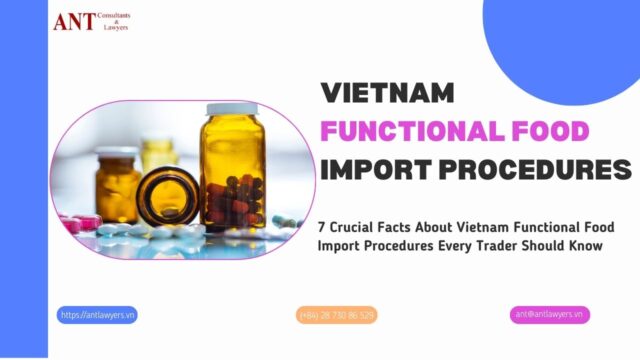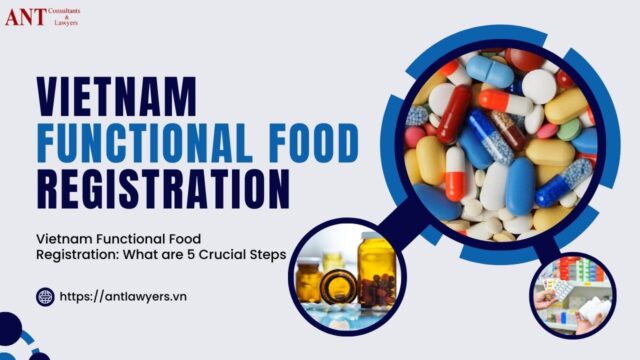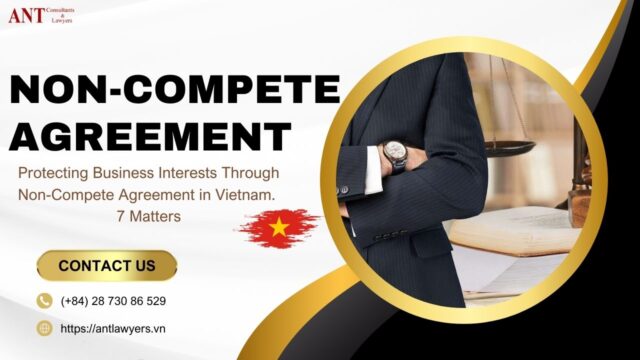Entering the Vietnamese market with functional foods can be a rewarding endeavor, but the path is far from straightforward.
The meticulous regulatory landscape in Vietnam reflects a firm commitment to ensuring the safety and efficacy of all food products, especially those marketed as health enhancing.
Foreign traders may find themselves navigating a maze of bureaucratic requirements, lengthy approval timelines in Vietnam functional food registration process, and rigorous inspections, all of which highlight the challenges in dealing with products of consumer health.
For businesses unfamiliar with these processes, the Vietnam functional food import procedures can feel like an uphill battle.
Missing documentation or non-compliance with Vietnam’s strict guidelines can result in significant delays or outright rejection of products at customs.
However, being prepared, and understanding the intricacies of these procedures can transform these challenges into opportunities for a smoother entry into the promising market of Vietnam.
Understanding Vietnam’s Focus on Functional Food Regulation
Functional foods occupy a critical space between dietary supplements and medicines, offering health benefits beyond basic nutrition.
Given their potential to directly affect consumer health, Vietnam enforces rigorous standards for importing these products. The Law on Food Safety and guidance regulations form the backbone of Vietnam’s functional food import procedures, emphasizing quality assurance and consumer safety.
Vietnam’s authorities are especially cautious about functional foods because of their wide ranging ingredients being herbal extracts, amino acids, vitamins, and minerals.
These components can vary in potency and potential risks, necessitating detailed scrutiny at every stage of the import process.
The Step-by-Step Guide to Vietnam Functional Food Import Procedures
Navigating the Vietnam functional food import procedures requires patience, precision, and a keen understanding of the country’s regulatory expectations.
Here’s a detailed breakdown of the key steps:
1. Classification of Functional Food Products
The first step in the process is classifying your product to determine the applicable regulatory framework. Functional foods in Vietnam are typically distinguished from other food products based on their intended use, ingredients, and health claims.
Accurate classification ensures compliance with relevant regulations and eliminates unnecessary complications later in the process.
While specific customs codes are not required here, traders must articulate the product’s purpose clearly.
Misclassification can result in delays, additional fees, or the need for re-submission of documents.
2. Product Registration with the Vietnam Food Administration (VFA)
Before functional foods can be imported into Vietnam, they must be registered with the Vietnam Food Administration (VFA).
This step involves preparing a comprehensive dossier, which includes:
- Product Declaration Form: A detailed form specifying the product’s identity, usage, and formulation.
- Certificate of Free Sale (CFS): Issued by the competent authority in the product’s country of origin, confirming the product’s safety and legal status.
- Product Information File: Includes detailed information about the product’s ingredients, manufacturing processes, and quality control measures.
- Label Samples: Propose labels that meet Vietnam’s stringent labeling requirements.
The VFA scrutinizes these documents to ensure compliance with national safety standards. A Certificate of Product Registration is issued upon approval, allowing the product to be imported and distributed.
3. Compliance with Good Manufacturing Practices (GMP)
Functional food manufacturers must adhere to Good Manufacturing Practices (GMP) to demonstrate their commitment to quality and safety.
Vietnam accepts GMP certificates issued by reputable authorities in the product’s country of origin. If a manufacturer lacks a GMP certificate, equivalent documentation proving compliance with acceptable manufacturing standards must be provided.
Ensuring GMP compliance is non-negotiable and serves as a crucial checkpoint in Vietnam functional food import procedures. Non-compliance at this stage can derail the entire process.
4. Stringent Labeling Requirements
Vietnam’s labeling regulations are among the most rigorous globally, designed to provide clear and accurate information to consumers.
Labels for functional foods must include:
- The product’s name and nature.
- A comprehensive list of ingredients with quantities.
- Usage instructions and recommended dosage.
- Information about the manufacturer and importer, including names and addresses.
- A clearly visible expiration date.
All labels must be in Vietnamese or accompanied by a Vietnamese translation. Failure to comply with these requirements can result in product rejections at customs.
5. Import Licensing by the Ministry of Health
Once the product is registered and compliant with labeling regulations, the importer must obtain an import license from the Ministry of Health. The key requirements for this application include:
- Business Registration Certificate: Verifying the legal status of the importing entity.
- Product Registration Certificate: Issued by the Vietnam Food Administration.
This step confirms the importer’s adherence to Vietnam’s health and safety standards, ensuring that only vetted products enter the local market.
6. Customs Clearance
The final step in the Vietnam functional food import procedures is customs clearance. This involves:
- Document Verification: Customs officials review all submitted paperwork, including the import license and product registration.
- Physical Inspection: The goods are checked to ensure they match the documentation provided.
- Payment of Duties and Taxes: Import duties and taxes are calculated based on the product’s classification and declared value.
Customs clearance can be time-consuming, especially if inconsistencies or missing documentation are discovered. Foreign traders should prepare for this stage meticulously to avoid delays or fines.
The Challenges of Importing Functional Foods into Vietnam
While the above steps provide a roadmap, foreign traders often encounter significant challenges during Vietnam functional food import procedures.
Key pain points include:
- Regulatory Ambiguity: Vietnam’s legal framework for functional foods is comprehensive but can be difficult for foreign entities to interpret without local expertise.
- Language Barriers: Most official documents and communications with Vietnamese authorities must be in Vietnamese, posing a challenge for non-native speakers.
- Cultural Nuances: Understanding Vietnamese consumer preferences and regulatory expectations can take time.
Engaging with local lawyers can mitigate these challenges, offering traders valuable insights and support throughout the process, visibility to the process, and smooth communication in English to ensure getting proper update and feedback in timely manner.
Best Practices for a Smooth Import Process
To streamline the Vietnam functional food import procedures, consider these best practices:
- Start Early: Begin preparing your documents well in advance to account for any unforeseen delays.
- Engage Local Experts: Work with Vietnamese legal or regulatory consultants to navigate complex procedures.
- Focus on Quality Assurance: Ensure your product meets Vietnam’s GMP standards and all safety requirements.
- Maintain Compliance: Regularly update your knowledge of Vietnam’s regulatory landscape to avoid costly mistakes.
- Build Relationships: Establish strong connections with local distributors or regulatory authorities to facilitate smoother operations.
Opportunities in Vietnam’s Functional Food Market
Despite the challenges, Vietnam’s functional food market presents immense opportunities for foreign traders. The country’s growing middle class and increasing health consciousness among consumers have driven demand for high-quality functional foods. By complying with Vietnam functional food import procedures, businesses can position themselves as trusted suppliers in this thriving market.
Turning Challenges into Success
Vietnam functional food import procedures may appear daunting at first glance, but they reflect the country’s unwavering commitment to consumer safety and product quality. By understanding the regulatory landscape and adopting best practices, foreign traders can navigate these challenges effectively, paving the way for success in Vietnam’s lucrative market.
For those willing to invest the time and effort, Vietnam offers a dynamic platform for growth, innovation, and partnership in the functional food industry.
About ANT Lawyers, a Law Firm in Vietnam
We help clients overcome cultural barriers and achieve their strategic and financial outcomes, while ensuring the best interest rate protection, risk mitigation and regulatory compliance. ANT lawyers has lawyers in Ho Chi Minh city, Hanoi, and Danang, and will help customers in doing business in Vietnam.
Source: https://antlawyers.vn/update/vietnam-functional-food-import-procedures.html









